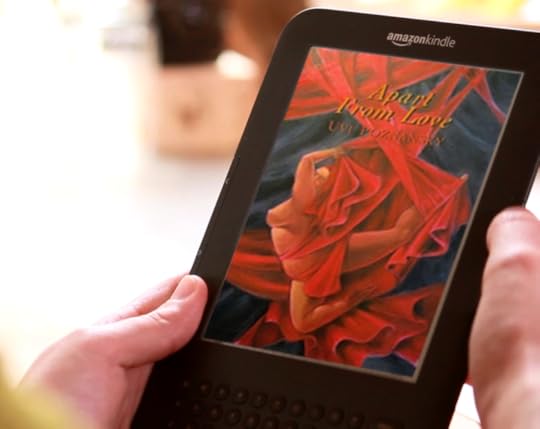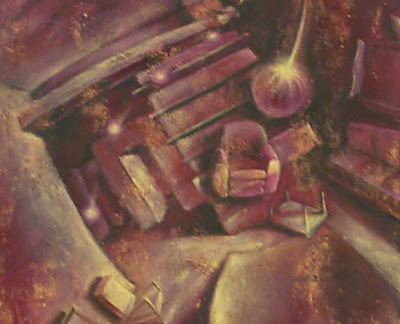Uvi Poznansky's Blog, page 191
August 28, 2014
#99cents #LaborDay #sale: Rise to Power and A Peek at Bathsheba
Tell your friend, tell your neighborTake a break from all your laborTime to open Rise to PowerPeek at Bathsheba from David's tower

★ One-day sale, just ahead of Labor Day ★Here is a rare opportunity:Get both volumes of The David ChroniclesFor a deep discount!
Rise to Power $0.99 (regular price $5.99)A Peek at Bathsheba $0.99 (regular price $5.99)
☻/ღ˚ •。* ˚ ˚✰˚ ˛★* 。 ღ˛° 。* ° ˚ • ★ *˚ .ღ 。/▌*˛˚ ░L░A░B░O░R░ - ░D░A░Y░ - ░S░A░L░E░ ˚ ✰* ★/ \ ˚. ★ *˛ ˚* ✰。˚ ˚ღ。* ˛˚ 。✰˚* ˚ ★ღ ˚ 。✰ •* ˚ " ✰ ”˜˜”*°•.¸☆ ★ ☆¸.•°*”˜˜”*°• One day only!

★ One-day sale, just ahead of Labor Day ★Here is a rare opportunity:Get both volumes of The David ChroniclesFor a deep discount!
Rise to Power $0.99 (regular price $5.99)A Peek at Bathsheba $0.99 (regular price $5.99)
☻/ღ˚ •。* ˚ ˚✰˚ ˛★* 。 ღ˛° 。* ° ˚ • ★ *˚ .ღ 。/▌*˛˚ ░L░A░B░O░R░ - ░D░A░Y░ - ░S░A░L░E░ ˚ ✰* ★/ \ ˚. ★ *˛ ˚* ✰。˚ ˚ღ。* ˛˚ 。✰˚* ˚ ★ღ ˚ 。✰ •* ˚ " ✰ ”˜˜”*°•.¸☆ ★ ☆¸.•°*”˜˜”*°• One day only!
Published on August 28, 2014 15:38
Behind the scenes look: being young, being old
When I sculpt a figure, such as here, in one of my earliest pieces, I let it age and become young again, adding and reducing wrinkles as the piece is being formed. For me, working on the audiobook of A Favorite Son is no different, and let me tell you why...

My work was lucky enough to attract the attention of an amazingly gifted voice actor, David Kudler. He is a man of a thousand voices. He says, "It's nice to let them out of my head from time to time." This story provides a great challenge for him, because it starts in the voice of Old Jacob, then as he plunges into the depth of his memories about a crime he committed in his youth, it continues in the voice of the young Jacob. Listen to 'take 1':
If your browser wouldn't play it, try this.
Problem is, the transition between the two voices, the old and the young. Because it happens 'turning on a dime', the listener may think that a new character has just stepped onto the scene. So, here is a different transition, where the voice of old Jacob trails off to a whisper, at the same time that the voice of young Jacob comes in from a whisper to full volume. Listen to 'Take 2:
If your browser wouldn't play it, try this.
Maybe I'm too picky, but I felt uneasy with 'take 2'. I figured, it is crucial we arrive at a good solution, one that does not jar the ear, one that invites the listener to the journey, so she takes a plunge into the past or rises out of it into the present, together with the character. It is also crucial because we will have more transitions coming up in the next three chapters of the book, so the same solution will apply. It will, in fact, become an audio motive of sorts.
What i envisioned in my mind was this: with no technological 'gimmick' (such as the double track of voices in 'Take 2'), David will start the transition being old, and gradually, word by word, become young! This may be a great acting challenge, because all the listener has to go on is your voice--there is no visual clue such as the incredible hulk changing color to green, and bursting out of a body of a small little guy, whose clothes hang in tatters by the end of the transition. Take a listen to 'take 3', which is the final take, and let me know what you think:
If your browser wouldn't play it, try this.
★ Love reading? Get this book ★
A Favorite Son★ Audiobook ★ Ebook ★ Print ★
"I can't praise the writing enough; the author has an incredible voice"

My work was lucky enough to attract the attention of an amazingly gifted voice actor, David Kudler. He is a man of a thousand voices. He says, "It's nice to let them out of my head from time to time." This story provides a great challenge for him, because it starts in the voice of Old Jacob, then as he plunges into the depth of his memories about a crime he committed in his youth, it continues in the voice of the young Jacob. Listen to 'take 1':
If your browser wouldn't play it, try this.
Problem is, the transition between the two voices, the old and the young. Because it happens 'turning on a dime', the listener may think that a new character has just stepped onto the scene. So, here is a different transition, where the voice of old Jacob trails off to a whisper, at the same time that the voice of young Jacob comes in from a whisper to full volume. Listen to 'Take 2:
If your browser wouldn't play it, try this.
Maybe I'm too picky, but I felt uneasy with 'take 2'. I figured, it is crucial we arrive at a good solution, one that does not jar the ear, one that invites the listener to the journey, so she takes a plunge into the past or rises out of it into the present, together with the character. It is also crucial because we will have more transitions coming up in the next three chapters of the book, so the same solution will apply. It will, in fact, become an audio motive of sorts.
What i envisioned in my mind was this: with no technological 'gimmick' (such as the double track of voices in 'Take 2'), David will start the transition being old, and gradually, word by word, become young! This may be a great acting challenge, because all the listener has to go on is your voice--there is no visual clue such as the incredible hulk changing color to green, and bursting out of a body of a small little guy, whose clothes hang in tatters by the end of the transition. Take a listen to 'take 3', which is the final take, and let me know what you think:
If your browser wouldn't play it, try this.
★ Love reading? Get this book ★
A Favorite Son★ Audiobook ★ Ebook ★ Print ★
"I can't praise the writing enough; the author has an incredible voice"
Published on August 28, 2014 07:02
August 26, 2014
A calm and steady hand that plucks the strings of her tale with a lyrical precision
I am so thrilled to discover an eloquent new review, written by a Top 500 Amazon Reviewer! Here is what Dii wrote for of my novel, A Peek at Bathshaba:
5.0 out of 5 stars Another Work of Art from Uvi Poznansky, August 25, 2014By Dii (Florida) - See all my reviews
(TOP 500 REVIEWER) This review is from: A Peek at Bathsheba (The David Chronicles Book 2) (Kindle Edition) Young David slew Goliath and became a hero, a legend, blessed by God to become a powerful and intelligent ruler, with a dream of uniting the many tribes. Time and the pressures of ruling with a firm, but wise hand have taken their toll as he ages and his priorities turn inward as he creates passion through poems and his words. A Peek at Bathsheba by Uvi Poznansky tells of an era in David’s life after he has established himself as king, with a household filled with many trophy wives, a sign of his importance and power. Still, when he sees the beautiful Bathsheba, he must have her and goes so far as to have her husband, loyal to both her and his King, murdered.
Young David slew Goliath and became a hero, a legend, blessed by God to become a powerful and intelligent ruler, with a dream of uniting the many tribes. Time and the pressures of ruling with a firm, but wise hand have taken their toll as he ages and his priorities turn inward as he creates passion through poems and his words. A Peek at Bathsheba by Uvi Poznansky tells of an era in David’s life after he has established himself as king, with a household filled with many trophy wives, a sign of his importance and power. Still, when he sees the beautiful Bathsheba, he must have her and goes so far as to have her husband, loyal to both her and his King, murdered.
Haven’t many wondered of the story of David and Bathsheba, of her influence on him, his love for her and of the live they shared, sometimes passionate, sometimes painful? David is portrayed as having more passion for his surroundings, his poetry and his artistic side, caring less about the political machinations going on around him. Bathsheba appears strong, yet is an outcast among David’s other wives, which proves to bring heartbreak to the couple. Did Bathsheba weaken David or did she give him what he needed when he most needed it to be strong?
Uvi Poznansky has brought a piece of biblical history to life looking upon these characters as humans, with frailties and flaws, giving us a chance to feel we understand a little more of lives lived long ago. Without the needs for the speech of the era, Ms. Poznansky delivers a deeply thought-provoking tale written with the artistic grace that is her signature style. She writes with a calm and steady hand that plucks the strings of her tale with a lyrical precision that leaves the reader deeply entrenched in her words long after the last page.
5.0 out of 5 stars Another Work of Art from Uvi Poznansky, August 25, 2014By Dii (Florida) - See all my reviews
(TOP 500 REVIEWER) This review is from: A Peek at Bathsheba (The David Chronicles Book 2) (Kindle Edition)
 Young David slew Goliath and became a hero, a legend, blessed by God to become a powerful and intelligent ruler, with a dream of uniting the many tribes. Time and the pressures of ruling with a firm, but wise hand have taken their toll as he ages and his priorities turn inward as he creates passion through poems and his words. A Peek at Bathsheba by Uvi Poznansky tells of an era in David’s life after he has established himself as king, with a household filled with many trophy wives, a sign of his importance and power. Still, when he sees the beautiful Bathsheba, he must have her and goes so far as to have her husband, loyal to both her and his King, murdered.
Young David slew Goliath and became a hero, a legend, blessed by God to become a powerful and intelligent ruler, with a dream of uniting the many tribes. Time and the pressures of ruling with a firm, but wise hand have taken their toll as he ages and his priorities turn inward as he creates passion through poems and his words. A Peek at Bathsheba by Uvi Poznansky tells of an era in David’s life after he has established himself as king, with a household filled with many trophy wives, a sign of his importance and power. Still, when he sees the beautiful Bathsheba, he must have her and goes so far as to have her husband, loyal to both her and his King, murdered.Haven’t many wondered of the story of David and Bathsheba, of her influence on him, his love for her and of the live they shared, sometimes passionate, sometimes painful? David is portrayed as having more passion for his surroundings, his poetry and his artistic side, caring less about the political machinations going on around him. Bathsheba appears strong, yet is an outcast among David’s other wives, which proves to bring heartbreak to the couple. Did Bathsheba weaken David or did she give him what he needed when he most needed it to be strong?
Uvi Poznansky has brought a piece of biblical history to life looking upon these characters as humans, with frailties and flaws, giving us a chance to feel we understand a little more of lives lived long ago. Without the needs for the speech of the era, Ms. Poznansky delivers a deeply thought-provoking tale written with the artistic grace that is her signature style. She writes with a calm and steady hand that plucks the strings of her tale with a lyrical precision that leaves the reader deeply entrenched in her words long after the last page.
Published on August 26, 2014 18:00
A chance is not something that is given. It is something you take.
My very first 'real' job was at T.O.A.M., a small architectural firm in Haifa, Israel. The work done in this firm was not part of the architectural mainstream. On the drawing board were the Israel Oceanographic and Limnological Research Institute, which "dabbles it feet in the water" (as architect Ram Karmi described it.) Also, Beit Halohem (The Fighter's Home) which exhibits "impressive virtuosity in geometric combinations" (as architect Abba Elhanani wrote of it.)
At the beginning of my four years at the firm—a period which coincided with my studies at the Technion—I was thrilled at the opportunity to learn. But after a while I started to feel uneasy with the limited responsibility I was given, designing various details, such as staircases, railings, and small spaces in Beit HaLochem.

I went to my boss, the notoriously famous architect David Yanai, who at the time had exposed a corruption scandal in the construction of the project. The public fight which ensued meant that Beit Halochem was already doomed to remain on paper. I was young, and oblivious to this. All I wanted was to take a greater role in the design. I told him, "I want to be given a chance."
He replied—I will never forget it—"A chance is not something that is given. It is something you take."
Either way, I came out of that meeting with the chance I wanted: My new responsibility was to design the entire landscape around Beit Halochem, which was to be built on the side of the Carmel mountain, overlooking a breathtaking view of Haifa Bay.

In later years, when I came to visit the site, I saw the skeletal remains of the building, rusting there among the rocks on the steep slope, which is overgrown with thorny, wild weeds. Still, I see in my minds eye is papers upon papers of my landscape design, still rustling there, waiting. And all I can hear are those words, "A chance is not something that is given. It is something you take."
At the beginning of my four years at the firm—a period which coincided with my studies at the Technion—I was thrilled at the opportunity to learn. But after a while I started to feel uneasy with the limited responsibility I was given, designing various details, such as staircases, railings, and small spaces in Beit HaLochem.

I went to my boss, the notoriously famous architect David Yanai, who at the time had exposed a corruption scandal in the construction of the project. The public fight which ensued meant that Beit Halochem was already doomed to remain on paper. I was young, and oblivious to this. All I wanted was to take a greater role in the design. I told him, "I want to be given a chance."
He replied—I will never forget it—"A chance is not something that is given. It is something you take."
Either way, I came out of that meeting with the chance I wanted: My new responsibility was to design the entire landscape around Beit Halochem, which was to be built on the side of the Carmel mountain, overlooking a breathtaking view of Haifa Bay.

In later years, when I came to visit the site, I saw the skeletal remains of the building, rusting there among the rocks on the steep slope, which is overgrown with thorny, wild weeds. Still, I see in my minds eye is papers upon papers of my landscape design, still rustling there, waiting. And all I can hear are those words, "A chance is not something that is given. It is something you take."
Published on August 26, 2014 06:57
August 24, 2014
Engrossing, Personable, and Poetic #audible #audiobook
Lovely new audible review by Jennifer Garcia for the audiobook edition of Rise to Power:
 FollowJennifer GarciaLos Angeles, CA USA08-24-14OverallPerformanceStory
FollowJennifer GarciaLos Angeles, CA USA08-24-14OverallPerformanceStory
I am not well versed in the bible and did not really know the story of David. So this story was like reading any other historical fiction, but so much better.
The story begins with David ill and dying. As he fades away, losing his kingdom, he tells the story of his life. It is an interesting and well told story. It was history told in a modern way, which made it so easy to understand. There were no complicated words to look up or try to understand. It was all very straight forward. It made the flow of the story seamless.
David grew up with a struggle but a lot of smarts or luck on his side. As much trouble as he found, he seems to have weaseled his way out of it all. I was completely engrossed once David began to tell his story, and found his story telling to be personable and poetic.
If you like historical fiction and great story telling, I recommend this book to you.

 FollowJennifer GarciaLos Angeles, CA USA08-24-14OverallPerformanceStory
FollowJennifer GarciaLos Angeles, CA USA08-24-14OverallPerformanceStory"Engrossing, Personable, and Poetic"This is the second book of Uvi's I've read and I enjoyed it. First, I'd like to say that the audio version is incredible and the narrator excellent. He truly did a wonderful job telling this story.
I am not well versed in the bible and did not really know the story of David. So this story was like reading any other historical fiction, but so much better.
The story begins with David ill and dying. As he fades away, losing his kingdom, he tells the story of his life. It is an interesting and well told story. It was history told in a modern way, which made it so easy to understand. There were no complicated words to look up or try to understand. It was all very straight forward. It made the flow of the story seamless.
David grew up with a struggle but a lot of smarts or luck on his side. As much trouble as he found, he seems to have weaseled his way out of it all. I was completely engrossed once David began to tell his story, and found his story telling to be personable and poetic.
If you like historical fiction and great story telling, I recommend this book to you.

Published on August 24, 2014 17:45
August 23, 2014
Bring me along, when you celebrate Labor Day
Bring me along when you celebrate Labor Day Apart From Love, I'm your prize It's a chance to imagine, to let me play A story of passion before your eyes Take a deep breath and take me outdoors Watch the leaves falling, singing autumn blues If you touch me, I'll be all yours My pages will rustle, and awaken your muse

A Peek at Bathsheba★ Audio ★ Ebook ★ Print ★
Rise to Power
★ Audio ★ Ebook ★ Print ★
Apart From Love★ Audio ★ Ebook ★ Print ★
A Favorite Son★ Audio ★ Ebook ★ Print ★
Home
★ Audio ★ Ebook ★ Print ★
Twisted★ Audio ★ Ebook ★ Print ★

A Peek at Bathsheba★ Audio ★ Ebook ★ Print ★
Rise to Power
★ Audio ★ Ebook ★ Print ★
Apart From Love★ Audio ★ Ebook ★ Print ★
A Favorite Son★ Audio ★ Ebook ★ Print ★
Home
★ Audio ★ Ebook ★ Print ★
Twisted★ Audio ★ Ebook ★ Print ★
Published on August 23, 2014 18:23
Pyramus and Thisby, or How We View Slang in Literature
You may recall the play-in-a-play, performed by the rude mechanics at the end of Midsummer Night's Dream, aptly described in their own words as 'The most lamentable comedy, and most cruel death of Pyramus and Thisby.' These would-be actors, whose ability to express themselves is unabashedly mocked by their audience, are used by Shakespeare mainly for comic relief. The play they perform is merely a farce of the Romeo and Juliet love story. Why, you may ask? Because like most artists and playwrights of that era, the bard knew only too well that he ought to entertain and complement his patrons, the most important of which where members of the royal court. This is the reason that characters who speak in slang were nearly never placed center-stage, as the hero of the story. Such characters were portrayed as simpletons, and by no means were they given any depth of feeling.
It was only later in the history of literature that characters of the lower class were taken seriously, and their point of view began to resonate, despite much controversy, with readers and theatre goers. For example, Between 1961 and 1982, The Catcher in the Rye was the most censored book in high schools and libraries in the United States. And yet today, it is recognized as an American classic, giving voice to teenage confusion, angst, alienation and rebellion. I suggest to you that in even today, there are two clashing views about the use of slang-talking characters, one from those who see themselves as 'upscale, educated nobility'--and the other, the more 'democratic' one, from the rest of us.
Recently I was reminded of this clash, when I posted an excerpt from Apart From Love in Anita's voice. You would be hard-pressed to find a three-syllable word in anything she says. The lack of long words is compensated by descriptive sequence of short words (see the replacement for ‘magnifying glass’ below.) You can spot a liberal use of the dreaded double-negative, and of the word ‘like’. In the excerpt she describes the memory of her first kiss with Lenny. Some readers told me, tongue-in-cheek, that the would need a cold shower by the time she completes her story. But one reader found the style of the excerpt incosistent. He complained that at times Anita is lyrical, and at other times her thoughts are expressed in slang.
As a side note, let me share a little secret with you: even though that reader rejected the excerpt on intellectual grounds (which he is entitled to do) he did get it on an intuitive level. How do I know this? Because the very same day I got a 'romantic' invitation from him to join a social network for setting up dates. So, Anita's hot description did its charm on him, and for some reason, he must have combined to two of us in his mind. I had a little chuckle about this, as did my loved one...
So I ask you: why can't a character combine both? Are we still bound to write for the Pyramus and Thisby audience? Even if your grammar is atrocious, even if your vocabulary is somewhat lacking, does that mean you can't feel the throes of pain, or the exhilaration of joy? Does it mean you can't paint what you see, feel and think? As you form your own answer, I invite you to sense the texture and the power of unrefined language, by listening to Anita's voice once more:
"What matters is only what’s here. I touch my skin right under my breasts, which is where the little one’s curled, and where he kicks, ‘cause he has to. Like, he don’t feel so cosy no more. Here, can you feel it? I reckon he wants me to talk to him. He can hear me inside, for sure. He can hear every note of this silvery music.
It ripples all around him, wave after wave. I can tell that it’s starting to sooth him. It’s so full of joy, of delight, even if to him, it’s coming across somewhat muffled. Like a dream in a dream, it’s floating inside, into his soft, tender ear.
I close my eyes and hold myself, wrapping my arms real soft—around me around him—and I rock ever so gently, back and forth, back and forth, with every note of this silvery marvel. You can barely hear me—but here I am, singing along. I’m whispering words into myself, into him."

★ Love reading? Get this book ★
Apart From Love★ Audio ★ Ebook ★ Print ★
“A very passionate book! Gripping, riveting, and fascinating!”
It was only later in the history of literature that characters of the lower class were taken seriously, and their point of view began to resonate, despite much controversy, with readers and theatre goers. For example, Between 1961 and 1982, The Catcher in the Rye was the most censored book in high schools and libraries in the United States. And yet today, it is recognized as an American classic, giving voice to teenage confusion, angst, alienation and rebellion. I suggest to you that in even today, there are two clashing views about the use of slang-talking characters, one from those who see themselves as 'upscale, educated nobility'--and the other, the more 'democratic' one, from the rest of us.
Recently I was reminded of this clash, when I posted an excerpt from Apart From Love in Anita's voice. You would be hard-pressed to find a three-syllable word in anything she says. The lack of long words is compensated by descriptive sequence of short words (see the replacement for ‘magnifying glass’ below.) You can spot a liberal use of the dreaded double-negative, and of the word ‘like’. In the excerpt she describes the memory of her first kiss with Lenny. Some readers told me, tongue-in-cheek, that the would need a cold shower by the time she completes her story. But one reader found the style of the excerpt incosistent. He complained that at times Anita is lyrical, and at other times her thoughts are expressed in slang.
As a side note, let me share a little secret with you: even though that reader rejected the excerpt on intellectual grounds (which he is entitled to do) he did get it on an intuitive level. How do I know this? Because the very same day I got a 'romantic' invitation from him to join a social network for setting up dates. So, Anita's hot description did its charm on him, and for some reason, he must have combined to two of us in his mind. I had a little chuckle about this, as did my loved one...
So I ask you: why can't a character combine both? Are we still bound to write for the Pyramus and Thisby audience? Even if your grammar is atrocious, even if your vocabulary is somewhat lacking, does that mean you can't feel the throes of pain, or the exhilaration of joy? Does it mean you can't paint what you see, feel and think? As you form your own answer, I invite you to sense the texture and the power of unrefined language, by listening to Anita's voice once more:
"What matters is only what’s here. I touch my skin right under my breasts, which is where the little one’s curled, and where he kicks, ‘cause he has to. Like, he don’t feel so cosy no more. Here, can you feel it? I reckon he wants me to talk to him. He can hear me inside, for sure. He can hear every note of this silvery music.
It ripples all around him, wave after wave. I can tell that it’s starting to sooth him. It’s so full of joy, of delight, even if to him, it’s coming across somewhat muffled. Like a dream in a dream, it’s floating inside, into his soft, tender ear.
I close my eyes and hold myself, wrapping my arms real soft—around me around him—and I rock ever so gently, back and forth, back and forth, with every note of this silvery marvel. You can barely hear me—but here I am, singing along. I’m whispering words into myself, into him."

★ Love reading? Get this book ★
Apart From Love★ Audio ★ Ebook ★ Print ★
“A very passionate book! Gripping, riveting, and fascinating!”
Published on August 23, 2014 07:56
August 22, 2014
I especially liked how she ushered in a new era with the ending
Jan Romes is the author of witty contemporary romance books, and a part-time fitness trainer. She also enjoys growing pumpkins and sunflowers. I am thrilled to find her review of A Peek at Bathsheba:
5.0 out of 5 stars Excellent read!, August 21, 2014By Jan Romes - See all my reviewsVerified Purchase(What's this?)This review is from: A Peek at Bathsheba (The David Chronicles Book 2) (Kindle Edition) This is the first time I've read this author and it won't be the last. I loved A PEEK OF BATHSHEBA! Ms. Poznansky transported me back to an interesting period of time with history, romance, and her eloquent style of writing. I enjoyed her unique way of describing the actions and reactions of her characters. She did a marvelous job with the setting as well. I especially liked how she ushered in a new era with the ending. In error I started with Book #2 in the David Chronicles. I'll get Book #1 and I'm sure I'll enjoy it just as much.
This is the first time I've read this author and it won't be the last. I loved A PEEK OF BATHSHEBA! Ms. Poznansky transported me back to an interesting period of time with history, romance, and her eloquent style of writing. I enjoyed her unique way of describing the actions and reactions of her characters. She did a marvelous job with the setting as well. I especially liked how she ushered in a new era with the ending. In error I started with Book #2 in the David Chronicles. I'll get Book #1 and I'm sure I'll enjoy it just as much.
5.0 out of 5 stars Excellent read!, August 21, 2014By Jan Romes - See all my reviewsVerified Purchase(What's this?)This review is from: A Peek at Bathsheba (The David Chronicles Book 2) (Kindle Edition)
 This is the first time I've read this author and it won't be the last. I loved A PEEK OF BATHSHEBA! Ms. Poznansky transported me back to an interesting period of time with history, romance, and her eloquent style of writing. I enjoyed her unique way of describing the actions and reactions of her characters. She did a marvelous job with the setting as well. I especially liked how she ushered in a new era with the ending. In error I started with Book #2 in the David Chronicles. I'll get Book #1 and I'm sure I'll enjoy it just as much.
This is the first time I've read this author and it won't be the last. I loved A PEEK OF BATHSHEBA! Ms. Poznansky transported me back to an interesting period of time with history, romance, and her eloquent style of writing. I enjoyed her unique way of describing the actions and reactions of her characters. She did a marvelous job with the setting as well. I especially liked how she ushered in a new era with the ending. In error I started with Book #2 in the David Chronicles. I'll get Book #1 and I'm sure I'll enjoy it just as much.
Published on August 22, 2014 06:32
August 21, 2014
David sending Uriah to his death so he can marry his wife
Next morning I sit down at my desk to write a letter to Joav. “Put Uriah out in front,” I write, “where the fighting is fiercest.”I take a deep breath, dip my feather in ink and shake it, that it may not bleed.“Then,” I go on writing, “withdraw from him, so he will be struck down and die.”I seal the scroll and give it to my dear, trusty soldier, knowing he would never suspect he is carrying his own death sentence in his hand.And for a long time after the sound of his steps has died down I remain there, sitting at the edge of my throne, listening for him, hoping he would come back to me, wishing I could find a way to save him.
David in A Peek at Bathsheba
This is the moment that David signs the death sentence for his soldier Uriah, and lets him carry it unknowingly to his commander, so his life would be placed in jeopardy on the battlefield.
I slowed this moment down, quite deliberately, by having him pause to take care of his pen so it does not bleed, while he is contemplating shedding the blood of his soldier. At this point David can still change his mind, still refrain from betraying Uriah over the love of his woman, Bathsheba. The crime has not been committed, yet. Watching him from the shadows, we would be tempted to cry out, Stop! There's still time, don't do this! Don't put pen to papyrus!
To me, the contemplation of a crime is more interesting than the crime itself. This moment in David's story is so pregnant with possibilities that it inspired many artists to capture it on canvas, which inspires me in writing my novel. Here are two paintings by Pieter Lastman, a Dutch painter of historical pieces (his pupils included Rembrandt.) In the first painting, David hands the letter to his kneeling soldier, and the relationship between them seems, to all appearances, like one between a benevolent ruler and an obedient subject--if not for the reaction of the boy (who may be a young scribe, or his son) who raises his eyes in great alarm. Like us, he is holding himself back from shouting, Stop!
The second painting depicts the same moment, yet it is executed eight years later. Here, Pieter went to more explicit extremes. The boy has the same expression of mute horror, but look at the relationship between David and Uriah. David, clad in a blue-purple robe and red cape and bearing a golden scepter, is squirming uncomfortably on his throne, knowing that what he is about to do is utterly wrong. Uriah, kneeling before him, seems to suspect the truth, because his posture is one of being repelled, trying to increase the distance between the king and himself. A dog, the symbol of loyalty, separates between them.
In both paintings, the background behind Uriah depicts a holy building (modeled after of St. Peter's Basilica, rumored to contain pillars from the Temple in Jerusalem), suggesting God's presence on his side. In the earlier painting, the sky behind him portends danger. In the latter one, the crimps and folds in fabrics that seem to rustle in the foreground give an unsettling feeling.
 Pieter Lastman, King David Handing the Letter to Uriah, 1611
Pieter Lastman, King David Handing the Letter to Uriah, 1611
 Pieter Lastman, King David Handing the Letter to Uriah, 1619
Pieter Lastman, King David Handing the Letter to Uriah, 1619
Just released! Volume II of the trilogy:
A Peek at Bathsheba
★ Audio ★ Ebook ★ Print ★
Volume I of the trilogy: Rise to Power★ Audio ★ Ebook ★ Print ★
"She writes with exquisite prose and elegant style,
yet delivers piercing truth and insights into the human psyche on the way.
A wonderful read."
David in A Peek at Bathsheba
This is the moment that David signs the death sentence for his soldier Uriah, and lets him carry it unknowingly to his commander, so his life would be placed in jeopardy on the battlefield.
I slowed this moment down, quite deliberately, by having him pause to take care of his pen so it does not bleed, while he is contemplating shedding the blood of his soldier. At this point David can still change his mind, still refrain from betraying Uriah over the love of his woman, Bathsheba. The crime has not been committed, yet. Watching him from the shadows, we would be tempted to cry out, Stop! There's still time, don't do this! Don't put pen to papyrus!
To me, the contemplation of a crime is more interesting than the crime itself. This moment in David's story is so pregnant with possibilities that it inspired many artists to capture it on canvas, which inspires me in writing my novel. Here are two paintings by Pieter Lastman, a Dutch painter of historical pieces (his pupils included Rembrandt.) In the first painting, David hands the letter to his kneeling soldier, and the relationship between them seems, to all appearances, like one between a benevolent ruler and an obedient subject--if not for the reaction of the boy (who may be a young scribe, or his son) who raises his eyes in great alarm. Like us, he is holding himself back from shouting, Stop!
The second painting depicts the same moment, yet it is executed eight years later. Here, Pieter went to more explicit extremes. The boy has the same expression of mute horror, but look at the relationship between David and Uriah. David, clad in a blue-purple robe and red cape and bearing a golden scepter, is squirming uncomfortably on his throne, knowing that what he is about to do is utterly wrong. Uriah, kneeling before him, seems to suspect the truth, because his posture is one of being repelled, trying to increase the distance between the king and himself. A dog, the symbol of loyalty, separates between them.
In both paintings, the background behind Uriah depicts a holy building (modeled after of St. Peter's Basilica, rumored to contain pillars from the Temple in Jerusalem), suggesting God's presence on his side. In the earlier painting, the sky behind him portends danger. In the latter one, the crimps and folds in fabrics that seem to rustle in the foreground give an unsettling feeling.
 Pieter Lastman, King David Handing the Letter to Uriah, 1611
Pieter Lastman, King David Handing the Letter to Uriah, 1611 Pieter Lastman, King David Handing the Letter to Uriah, 1619
Pieter Lastman, King David Handing the Letter to Uriah, 1619Just released! Volume II of the trilogy:
A Peek at Bathsheba
★ Audio ★ Ebook ★ Print ★
Volume I of the trilogy: Rise to Power★ Audio ★ Ebook ★ Print ★
"She writes with exquisite prose and elegant style,
yet delivers piercing truth and insights into the human psyche on the way.
A wonderful read."
Published on August 21, 2014 09:01
Perhaps at last he can feel her
This is the place where he put pen to paper... But clung to the wall, the shelves are now bare All that remains of his words is but vapor All you can spot is but a dent in his chair
He used to sit here, here he would stare Years come, years go, an old clock keeping score, He would scribble his notes, crumple them in despair Waiting for his savior—but locking that door
That door sealed him off, away from all danger Except from the depth of the danger within No one could intrude here, except for the stranger Who would carry him off to where his end would begin—
The poet, who’d mourned the loss of his mother Would then, somehow, be reduced to a child He would crouch at the threshold, and call, call, call her Knock, knock, knock at that door; no more stifled, but wild
This is the place where he put pen to paper Till the door opened, creaking on a hinge... Locked in embrace, perhaps at last he can feel her No need to cry now, can't feel that twinge
 Detail from my oil painting, My Father's Armchair. You can barely see down at the far depth, but hiding in the shadows is the entrance door to this place, where I grew up and where my father spent the last twenty four years of his life, alone.
Detail from my oil painting, My Father's Armchair. You can barely see down at the far depth, but hiding in the shadows is the entrance door to this place, where I grew up and where my father spent the last twenty four years of his life, alone.
★ Love poetry? Get this book ★
Home
★ Audio ★ Ebook ★ Print ★"Not only does the author take the reader into a wonderful world where words are like music, ebbing and flowing with a rhythm that is captivating and beautiful, but she also gives life to her father's writings"
He used to sit here, here he would stare Years come, years go, an old clock keeping score, He would scribble his notes, crumple them in despair Waiting for his savior—but locking that door
That door sealed him off, away from all danger Except from the depth of the danger within No one could intrude here, except for the stranger Who would carry him off to where his end would begin—
The poet, who’d mourned the loss of his mother Would then, somehow, be reduced to a child He would crouch at the threshold, and call, call, call her Knock, knock, knock at that door; no more stifled, but wild
This is the place where he put pen to paper Till the door opened, creaking on a hinge... Locked in embrace, perhaps at last he can feel her No need to cry now, can't feel that twinge
 Detail from my oil painting, My Father's Armchair. You can barely see down at the far depth, but hiding in the shadows is the entrance door to this place, where I grew up and where my father spent the last twenty four years of his life, alone.
Detail from my oil painting, My Father's Armchair. You can barely see down at the far depth, but hiding in the shadows is the entrance door to this place, where I grew up and where my father spent the last twenty four years of his life, alone.★ Love poetry? Get this book ★
Home
★ Audio ★ Ebook ★ Print ★"Not only does the author take the reader into a wonderful world where words are like music, ebbing and flowing with a rhythm that is captivating and beautiful, but she also gives life to her father's writings"
Published on August 21, 2014 07:20



